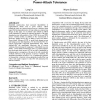Free Online Productivity Tools
i2Speak
i2Symbol
i2OCR
iTex2Img
iWeb2Print
iWeb2Shot
i2Type
iPdf2Split
iPdf2Merge
i2Bopomofo
i2Arabic
i2Style
i2Image
i2PDF
iLatex2Rtf
Sci2ools
130
Voted
DAC
2009
ACM
2009
ACM
Analysis and mitigation of process variation impacts on Power-Attack Tolerance
Embedded cryptosystems show increased vulnerabilities to implementation attacks such as power analysis. CMOS technology trends are causing increased process variations which impact the data-dependent power of deep submicron cryptosystem designs. In this paper, we use Monte Carlo methods in SPICE circuit simulations to analyze the statistical properties of the datadependent power with predictive 45nm CMOS device and ITRS process variation models. In addition to the "measurement to disclosure" (MTD) used in [3], we define a lower level metric, Power-Attack Tolerance (PAT), to model both dynamic power and leakage power data-dependence. We show that the PAT of a typical cryptographic component implementation using CMOS standard-cells can significantly deteriorate due to process variations, thus increasing the component's vulnerability to power attacks. Power-attack-resistant logic styles (e.g. SABL [9]) have been developed which increase PAT by an order of magnitude by bala...
DAC 2009 | Data-dependent Power | Design Automation | Leakage Power Data-dependence | Power Attacks |
Related Content
| Added | 12 Nov 2009 |
| Updated | 12 Nov 2009 |
| Type | Conference |
| Year | 2009 |
| Where | DAC |
| Authors | Lang Lin, Wayne P. Burleson |
Comments (0)

